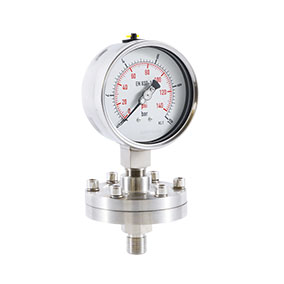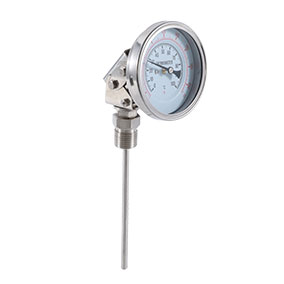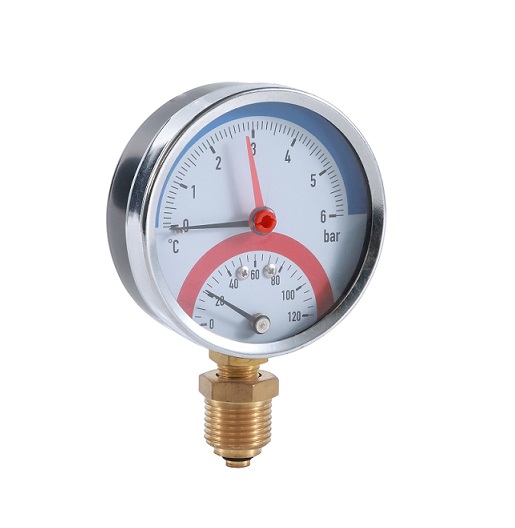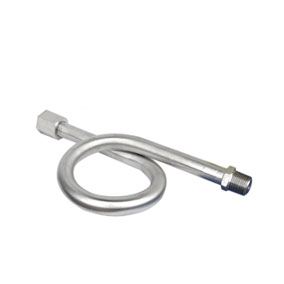Importance of Low Pressure Gauges
Low pressure gauges, as precision pressure measuring instruments, are widely used in various industries, such as chemical processing, food processing, and pharmaceuticals. In many production processes, accurate low pressure gauge measurements directly impact equipment safety, product quality, and production efficiency. With the continuous advancement of technology, low pressure gauges are playing an increasingly important role in modern industry. This article will discuss the definition, application scope, and importance of low pressure gauges in various industries.
1. Definition of Low Pressure Gauges
Low pressure gauges are instruments used to measure gas or liquid pressures below atmospheric pressure. Typically, low pressure gauges measure pressures between 0 and 1 MPa, or even lower. Compared to conventional pressure gauges, low pressure gauges offer greater sensitivity and accuracy, accurately reflecting pressure fluctuations. Common types of low pressure gauges include liquid gauges, spring gauges, and medidores de pressão diferencial. The selection of low pressure gauges varies depending on the measurement principle.
Low pressure gauges are often used in precision production processes, particularly in areas where gas and liquid pressure control is critical to product quality and safety. They are typically equipped with a calibration device to ensure accurate measurement results and withstand interference from external environmental factors, providing reliable pressure data.
2. Main Applications and Scopes of Low-Pressure Gauges
Low-pressure gauges are widely used in various industries and fields, particularly where precise control and monitoring of gas or liquid pressure is required. The following are some typical applications and scopes:
Chemical Industry: Many chemical reactions require low-pressure environments, such as distillation, adsorption, and gas exchange. Low-pressure gauges can be used to monitor gas pressure in reaction vessels or pipelines in real time to ensure the stability of the reaction process.
Food Processing Industry: Pressure control is crucial in food production and processing. For example, during beverage filling and packaging, low-pressure gauges can be used to control gas filling pressure to ensure product quality and safety.
Pharmaceutical Industry: Pharmaceutical processes require closed-loop material conversion or extraction under low-pressure conditions. Low-pressure gauges help production lines monitor pressure changes during the process and prevent production accidents.
HVAC (Heating, Ventilation, and Air Conditioning) Systems: Low-pressure gauges are used in HVAC systems to monitor the pressure of refrigerant and cooling water systems. In air conditioning and refrigeration equipment, low-pressure gauges are used to check system operating pressure, ensuring proper operation and preventing overload or damage.
Automotive Industry: In automotive manufacturing, low-pressure gauges are used to monitor pressure in tires, engines, and other critical systems to ensure safety and performance.
3. The Importance of Low-Pressure Gauges
Low-pressure gauges play a vital role in many industries, demonstrating their importance in the following ways:
Ensuring Production Safety: Many industrial processes and equipment require operation within a specific pressure range, especially those involving hazardous chemicals or high temperatures and pressures. Accurate low-pressure gauges can promptly detect abnormal pressures and prevent equipment failures or safety incidents caused by low or high pressures.
Improving Product Quality: In many production processes, particularly in precision manufacturing and food processing, low-pressure gauges help maintain stable pressure, which impacts the quality of the final product. For example, in food packaging, proper pressure prevents packaging damage and product leakage, ensuring that product quality meets standards.
Extending Equipment Life: Long-term inaccurate pressure control can lead to equipment damage or component degradation. Low-pressure gauges can promptly detect pressure fluctuations, preventing overloads or runaway conditions, thereby extending equipment life and reducing maintenance costs.
Optimizing Energy Efficiency: In some industrial applications, pressure stability is directly related to energy efficiency. Low-pressure gauges can help control and optimize equipment operating pressure, maintaining optimal operating conditions, thereby saving energy and reducing operating costs.
Complying with Industry Standards: Many industries have strict standards and regulations for equipment pressure monitoring. The use of low-pressure gauges can help companies comply with relevant laws and regulations, ensuring compliant production.
The application of medidor de cápsula de baixa pressão in various fields not only ensures the stability of production processes but also significantly improves safety and equipment life. As the demand for efficient and precise production continues to increase across industries, low-pressure gauges, as an indispensable measurement tool, will continue to play a vital role in industrial production.





